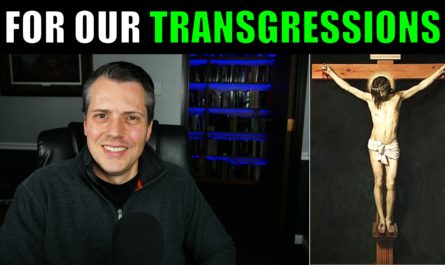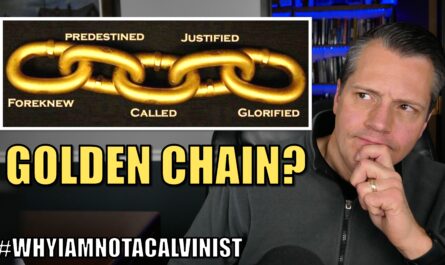One of the key tenets of Calvinism is the “U” in TULIP—unconditional election. This means that God has decided who would be saved and who would not. It is completely His decision. He would regenerate the ones He chose, causing them to have faith, while the others would never believe.
One of the passages used to support unconditional election is Acts 13:48.
Now when the Gentiles heard this, they were glad and glorified the word of the Lord. And as many as had been appointed to eternal life believed. (Acts 13:48)
As always, let’s begin with the context. Paul and Barnabas had just preached in the synagogue in Pisidia, but the Jews rejected their message. The Gentiles, however, wanted to hear more, so the next week they came out in droves—almost the whole city, in fact. The Jews, jealous of all the attention Paul was getting, caused a ruckus, so Paul and Barnabas rebuked them.
Then Paul and Barnabas grew bold and said, “It was necessary that the word of God should be spoken to you first; but since you reject it, and judge yourselves unworthy of everlasting life, behold, we turn to the Gentiles. For so the Lord has commanded us: ‘I have set you as a light to the Gentiles, that you should be for salvation to the ends of the earth.’ ” (Acts 13:46-47)
God had chosen the Jews to be the light to the world, but they largely refused. They should have been the light to the Gentiles—which, by the way, indicates that from the beginning the gospel was also open to the Gentiles.
When the Gentiles standing around heard that, they became ecstatic. God also wants us! So, many of them also believed.
Now when the Gentiles heard this, they were glad and glorified the word of the Lord. And as many as had been appointed to eternal life believed. (Acts 13:48)
So, the question is with this statement: “appointed to eternal life.” Did (does) God appoint some to be saved, and they are the ones who then believe?
At first glance, it seems to be an open-shut case for Calvinism. But is it really?
The first thing we have to do is define the word “appointed.” By the way, this word is translated as “ordained” in the KJV, making it sound even more Calvinistic. But what does it mean?
The Greek word is tasso (Strong’s 5021) which means:
- To arrange in an orderly manner
- Assign or dispose (to a certain position or lot)
- Appoint
- Determine
- Ordain
- Set
This word appears eight times in the New Testament, generally in the sense of setting something up.
Here are a few examples:
Then the eleven disciples went away into Galilee, to the mountain which Jesus had appointed for them. (Matthew 28:16)
When Paul was recounting his conversion experience, this is how he put it:
So I said, ‘What shall I do, Lord?’ And the Lord said to me, ‘Arise and go into Damascus, and there you will be told all things which are appointed for you to do.’ (Acts 22:10)
In the actual account of his experience, a phrase is used that is translated as “you will be told what you must do” (Acts 9:6). So, in this case, it was a command.
Paul used the word tasso in an interesting manner when writing to the Corinthians:
I urge you, brethren—you know the household of Stephanas, that it is the firstfruits of Achaia, and that they have devoted themselves to the ministry of the saints— that you also submit to such, and to everyone who works and labors with us. (1 Corinthians 16:15-16)
In the KJV, it is translated as “addicted.” They “addicted themselves to the ministry.”
If we translated the word as the KJV does in Acts 13:48, they ordained themselves to the ministry of the saints. That is interesting, because in this case, the “appointing” or “ordaining” came about of their own will.
Of course, context determines meaning, so we cannot determine meaning solely by how a word is used in other places.
As far as I can see, we have two options here.
The first option is that God determined that these people would believe and prompted them to do so.
I don’t necessarily have a problem with this. We know that God wanted the gospel to go to the Gentiles, and He may have done a specific work in the hearts of these Gentiles that would cause them to respond. While that is generally a Calvinistic idea, we can accept it, too. God can choose to prompt people in a way that He knows will cause them to believe, like He did with Paul. That’s why we pray for the salvation of people. What we do not agree with is that He has to do a special work of regeneration before they are able to believe.
There is, however, another possible way to interpret Acts 13:48, which is that rather than God determining that these people would believe, He knew they would. So, when Luke says that some were “appointed” to eternal life, he is saying that some people will believe. It will happen, and something that will happen cannot be changed, or it never could have been true that it “will” happen. The people who will believe will believe, so in that sense it is appointed or ordained. In that sense, we could interpret it this way: “The ones who were going to believe did believe.”
There is one way and only one way that things will turn out. We make decisions along the way that determine the outcome. However, the eventual outcome is the only outcome that ever would have happened.
For example, a couple years ago I bought a 2012 white Honda Civic. In the preceding weeks I looked at other vehicles and test drove some as I attempted to make my decision. At one point in the haggling process I even decided not to buy the one I did eventually buy. Purchasing the car was my decision. When all was said and done, I decided to buy it. Think about this: at any point in the whole process, was it true that I would buy a black Ford rather than a white Honda? No—even though I was making decisions, the eventual result would be the same. Now, go back a hundred years or 5,000 years—was it true then that I would one day buy the white Civic? Yes—it has always been true, even though I didn’t know it. God, however, did know it. I am not claiming that He forced my choice, but He knew what my choice would be. It was ordained, or appointed, that it would happen because I would one day choose it. My free will decisions determined the outcome, but the eventual outcome has always been that I would buy a white Honda Civic.
We can view salvation the same way. The ones who will be saved will be saved. If we could fast forward into eternity and take roll in Heaven, we might find people there who today have no interest in God. However, it is ordained that they will be there—not because God will force them, or chose them while excluding others, but because the reality is that they will one day have faith in Jesus.
So, in summary, I believe there are two possible interpretations of this passage. The first is that God did, in fact, do a special work in some that influenced them to believe so the gospel would continue to go to the Gentiles. The second is simply that there were some in attendance who would believe, so they did believe that day.



